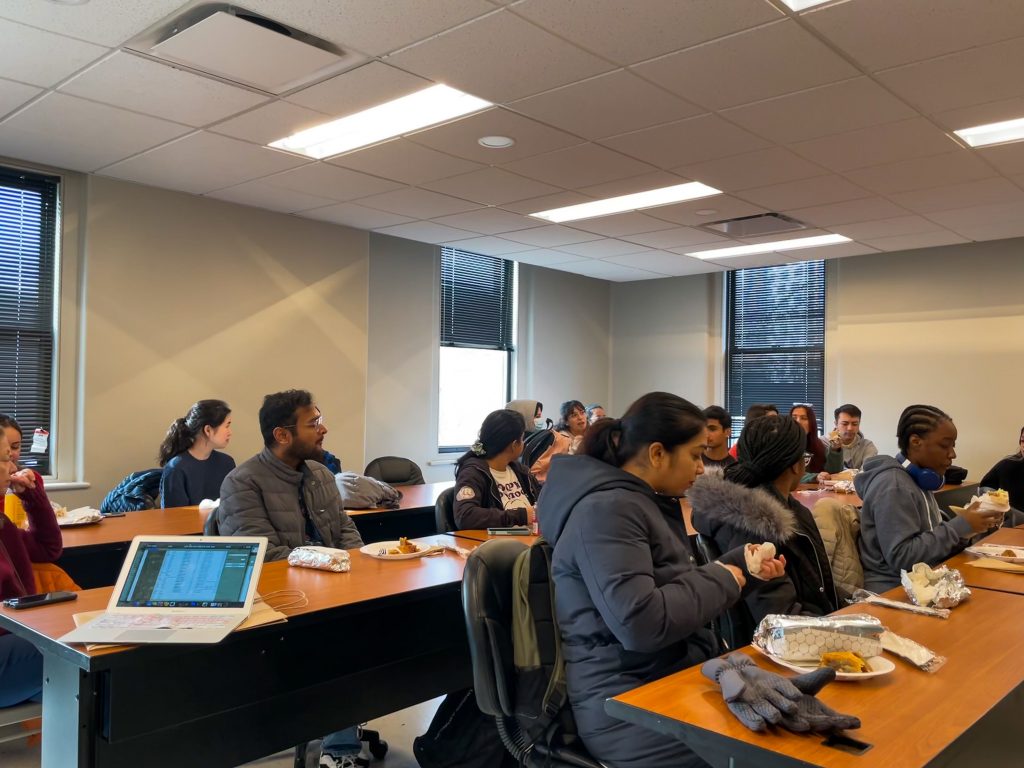
On Feb. 7, the International Students and Scholars Services (ISSS) collaborated with the Drexel University Counseling Center to host a Lunch & Dialogue event called “Love Across Culture, Language, and Identity.” Congregating in the Student Center for Diversity & Inclusion located in the Rush Building, international students from a wide range of departments gathered to discuss cultural differences regarding love and relationships. For lunch, Anyi Ye, an advisor from ISSS, provided chicken wraps, a vegetarian sandwich option and baklava for dessert for students who RSVP’d prior to the event.
Dr. Elena Cucco, a clinical psychologist from the Counseling Center, moderated the conversation and helped promote an inclusive space for the free flowing discussion. Students introduced themselves with their major of study, their home country and why they were interested in the event. The students originated from countries all across the globe, including Chile, India, Saudi Arabia, Uzbekistan, etc. Some students were attending Drexel to obtain a bachelor’s, while others were studying for a master’s or were enrolled in a PhD program at the university. The relationship status of individuals ranged as well, as various people were single, in a relationship or married. When introducing themselves, most people expressed an interest in mostly listening to the conversation as others shared dating experiences or expectations of their home country.
As the conversation started, it was quickly evident that relationship expectations and societal norms varied not only by country, but by different cultures and communities within that country. Variations ranged from different religions and different identities within the LGBTQ+ community to local community expectations and family dynamics.
Throughout the conversation, there were details that were touched upon. For instance, one student talked about the idea that someone is considered “free” until there is a ring on their finger; without the promise of marriage, there are no strong ties keeping one committed in the relationship. In contrast, a student who identifies as an agnostic talked about her experience living in Chile, where what was seen as the biggest symbol of commitment in a relationship was not getting married, but rather living together.
Public display of affection (PDA) was also mentioned briefly. While some couples do not shy away from PDA in the United States, a student expressed how PDA is mostly frowned upon in India; some people hold hands in public, but most refrain.
As the conversation continued, students delved deeper into different topics. A rich topic of discussion took place around family involvement in relationships. Another student from Chile who is a Jehovah’s Witness talked about how partners met each other’s parents on the first date. In the specific culture they grew up in, romantic relationships were very serious with marriage being the ultimate end goal.
A student from India talked about how their parents were open to letting them find their own partner, but also expressed the comfort of having an arranged marriage as an option. Your parents would find someone they think would be a good fit, you take some time to get to know them, and then you get married; it is not forced. The student expressed how this could eliminate the effort and stress of looking for someone yourself by just letting your family do the work.
The conversation progressed as students talked about how parents may look at class and religious differences. Some individuals expressed how parents may have a harder time approving a partner for their child if they are of a different religion. This impacted how some students view dating. However, other students noted how parents may be starting to be more accepting of differences.
Another large theme within the conversation was how cultures have changed over time. A student from Uzbekistan talked about how most girls back home got married at 18 or in their early twenties. However, as women continue to fight for more rights and equality, more and more are receiving an education and going into the workforce, thus marrying later.
Several students pointed out how their parents and those in the generation above them married young, had a home and a family by 21-years old, which seems unrealistic by our standards and in our economy.
While some countries are becoming more progressive as time goes, we cannot fail to notice how several are still not accepting different types of relationships. As of Dec. 2020, 69 UN member states criminalize same-sex activity and marriage, according to the International Lesbian, Gay Bisexual, Trans and Intersex Association (ILGA).
Students continued by talking about dating culture shocks they have experienced while coming to study in the United States as a young adult. While Americans typically see teenage girls dating as normal, young girls dating in other countries may be frowned upon and they might face societal criticism. It was suggested that this is a difference between collectivist cultures and the individualist values of Americans, as community opinion may matter more in other countries.
Ye shared her own prior college experience with the students. She talked about how her American roommate casually dating new people was a surprising concept when she came to the US from China.
Students also expressed concerns regarding their partner’s safety in the US, particularly living in the city of Philadelphia. Topics of vulnerability, communication issues and the online dating atmosphere in the US were also mentioned.
Towards the end of the conversation, the group reflected upon prioritizing their own happiness over societal norms as one matures. This includes discovering and loving yourself first before jumping into a relationship, so you can be ready to really get to know someone.
If you wish to talk to a therapist for free about these topics or more in a confidential setting, you can go to the Counseling Center in Creese Student Center or email [email protected] to schedule a Same Day Appointment.


